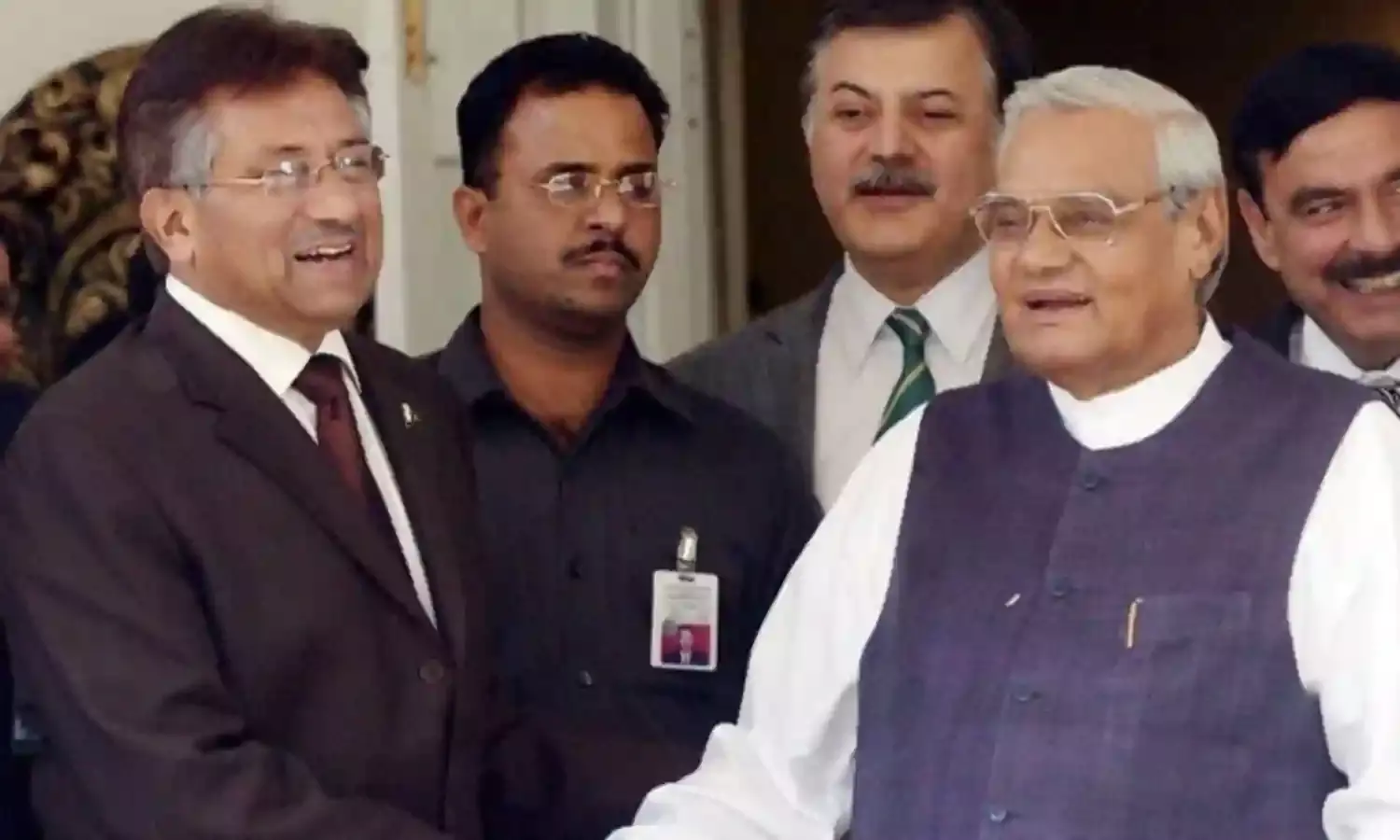The Fall Out Of The Failed Agra Summit
The cause of the tussle in Agra lay in the internal politics of the BJP;

The passing away of General Pervez Musharraf was seen in different perspectives. Ironically, the failure of the Agra Summit made it possibly the most historic Indo-Pak event. The failure became the point of departure for the hard line Hindutva which put down deep roots in double quick time.
On the general approach to Pakistan the Indian team was split. The assumption that Prime Minister Atal Behari Vajpayee and External Affairs Minister, Jaswant Singh would successfully navigate a soft line towards Pakistan was stoutly challenged by the rest of the Bharatiya Janata Party leadership, briefed persistently by the bureaucracy particularly hard liners like Vivek Katju.
The cause of the tussle between the two approaches lay in the internal politics of the BJP. It was clear as daylight that Vajpayee was firmly for a soft platform which entailed an attitude to Pakistan which became something of a chant with him. “We can’t change our neighbours, we have to live with them.”
The exact opposite of this approach was hard Hindutva, underpinned by an abiding anti Pakistan nationalism. Suspicion of Muslims and Kashmiris was integral to this approach. During election time hard or soft Hindutva became more a matter of tactics. Since the Agra summit took place in July, a section of the BJP leadership set its sight on the key elections to the UP Assembly which were due in six months, towards the end of February. For the explicit purpose of the UP elections, the hardlinewalas exerted every muscle to prevail.
To discard Vajpayee’s more inclusive line, the Summit was embellished with some comical touches. For instance when Vajpayee was deep into the room meant for the Summit, L.K. Advani trailed him for some last minute amendments to the Prime Minister’s approach.
The failure of the Summit, went the theory, would help the party triumph on hard Hindutva. Narendra Modi was nowhere on the horizon. But the hardline which was to place victory in the party’s lap, received a boost by something akin to divine intervention.
Osama bin Laden’s gang flew into the Twin Tower bringing Islamic terror into high global profile. 9/11 was to determine world politics, making it the single focus in what at that stage was a unipolar world.
Just imagine October of 2001. Islamophobia on an unprecedented scale. An atmosphere globally charged against Muslims, magnifies a mood that was conducive to a heavy saffronisation of the air over Gujarat.
It promoted the kind of politics which Modi was to embrace and amplify. Global Islamophobia seemed to justify the raw communalism that was pulsating below the surface.
A matter of extreme awkwardness for India entered the proceeding as America’s global war on terror incorporated Pakistan as a frontline state.
There could not have been a more embarrassing phase in Indo-US affairs. An incident demonstrates the extent of the embarrassment in Washington as well as New Delhi.
The United States’ Ambassador to New Delhi Robert Blackwill had established a tradition of hosting round-table lunches with set themes. The theme at one such lunch was Pakistan’s role in the US-led war on terror.
Pranab Mukherjee, then in the Opposition, raised his hand in great anger. “You are well aware of Pakistan plaguing us with cross border terrorism. And suddenly you have embraced Pakistan as a frontline state in your global war on terror.”
Blackwill tried to make light of it. “Your quarrel with Pakistan is a regional affair. At this juncture, Pakistan is our partner in the global war against terror.” How peeved the Indian guests around the table felt at the exchange will be etched on my mind for long.
The attack on Indian Parliament on December 13, led to Operation Parakram which brought Indian and Pakistani troops in an eye-ball to eye-ball confrontation. New Delhi made maximum anti Pak propaganda from the Parliament attack. And yet paradoxically the event cooled the general temperature.
Having been victimised on such a horrendous scale, New Delhi felt relieved having been elevated to a frontline status in the global war on terror.
What an irony. Two quarreling neighbours find themselves in fierce competition fighting America’s war on global terror.
It would appear that the stars were in their proper constellation for the BJP to come up trumps in Uttar Pradesh. To the general atmosphere conducive to hard Hindutva was the gathering of Karsevaks or volunteers in Ayodhya determined to embark on the construction of the Ram Temple to mark the BJP’s expected victory.
The UP election results were a shock. The BJP lost. The results were announced on February 24. Imagine the disappointment of the volunteers, thousands of them, as they dispersed from Ayodhya in deep despair.
In this black mood some of them boarded the Sabarmati Express which, on its way to Ahmedabad, passed Godhra on the morning of February 27, where a compartment was set ablaze resulting in the death of 56 passengers who could have been karsevaks. By nightfall, Ahmedabad and a series of towns in Gujarat were in the grip of unprecedented anti Muslim carnage.
Protected by Rajiv Vohra of the Gandhi Peace Foundation and a skull cap wearing correspondent of The Economist, when I reached the office of the Godhra Collector, Jayanti Ravi, she virtually threw up her hands. The Godhra carnage file had been handed over to Vijay Vipul, Director General, Anti Terror Squad, even before Ravi could study the case.
True anti Muslim excesses yielded political success serially but that trend was set when Gujarat, indeed the world was under the shroud of global Islamophobia. But the world has changed radically. How long can anti Muslim politics be sustained under the radically altered world order?
Saeed Naqvi is a senior journalist and writer. Views expressed here are his own.

